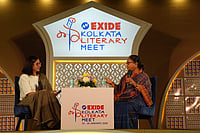Rehabilitation of the disgraced is a gradual process, but it arrives with a bang. The Trinamool Congress’s July 28 announcement naming Kunal Ghosh as a state-level party spokesperson is one such. Not only is Ghosh, a journalist-turned-media honcho-turned politician, a prime accused in the Saradha chit fund scam, he also tried to drag party chief Mamata Banerjee into the scam—one of Bengal’s biggest political scandals.
The TMC also inducted in the party expelled CPI(M) leader Ritabrata Banerjee and Chhatradhar Mahato, who once led the Maoist-backed Lalgarh movement during 2008-09, but it was Ghosh’s induction that struck political observers most. Speaking to journalists, some TMC leaders explained the layered message in Ghosh’s reinstatement (he was suspended for six years in 2013): if Mamata could take back Kunal Ghosh, no party deserter was untouchable.
Indeed, there were prior indications. Ghosh’s return to favour came barely a week after Mamata’s July 21 call to deserters and disgruntled leaders to return to the party. Soon after, Biplab Mitra, the TMC’s former Dakshin Dinajpur district unit president who had joined the BJP in June 2019, returned to the TMC. On August 6, former TMC minister Humayun Kabir, who fought the 2019 Lok Sabha elections on a BJP ticket, also returned to TMC.
It has been a steady trickle since then: over the first half of August, Hema Chaubey returned to the TMC from the Congress in West Midnapore, TMC’s former district vice president Bishnu Mahato returned from the BJP in Purulia, former Congress assembly poll candidate in Bankura Arun Pathak joined up and so did social worker Chandra Sekhar Kundu in Asansol, West Burdwan. At the panchayat and booth level it was a veritable backslide: dozens of workers and grassroots-level leaders joined the TMC from the BJP, the Congress and the Left.
“People are joining or returning to our party inspired by Mamata Banerjee’s development-centric politics and inclusive political approach,” says TMC secretary-general Partha Chatterjee.

According to political analyst Maidul Islam, the TMC’s induction drive is aimed at increasing its voteshare to ensure victory in the case of a close, nearly bipolar contest with the BJP in which the Left and the Congress, who are likely to fight together, would have little effect. “TMC bagged over 43 per cent of polled votes in the 2019 LS elections. This was about four percentage points above its 2014 Lok Sabha election voteshare and about one percentage point lower than the 2016 assembly election voteshare. Evidently, despite the loss of Lok Sabha seats (TMC lost 14 seats to the BJP, which got 18 seats in 2019) their core support base was not damaged. Now it wants to increase the voteshare by a few more percentage points,” Islam says.
In July, the TMC reorganised its state steering committee, the state working committee and the youth wing. It is expected to announce new panels at all the state’s 343 blocks by August-September.
A BJP state unit member says the party is closely monitoring the TMC’s reorganisation drive, which is expected to create a new group of malcontent leaders. “Leaders who would see their influence reducing in the TMC would mostly try to contact us,” says a BJP state unit vice president.
Ghosh’s induction seemed to have another use for TMC: creating an air of mistrust around Mukul Roy in the BJP. Over the past month, widespread talk about the possibility of Roy returning to the TMC forced the former Trinamool heavyweight to publicly refute the rumours. Ghosh is known to enjoy a cordial relation with Roy, once Mamata’s right-hand man. After joining BJP in November 2017, Roy dealt the TMC a rude blow in 2019 by getting a sitting TMC MP, a four-time MLA and a youth leader to defect—all three won the Lok Sabha elections on BJP tickets. After that success, Roy got TMC MLAs Tushar Kanti Bhattacharya, Subhranshu Roy, Biswajit Das, Dulal Bar, Monirul Islam, Sunil Singh, Wilson Champramari and Sabyasachi Dutta to join the BJP.
By appointing Roy as chairman of the election management committee for the 2018 panchayat polls, 2019 Lok Sabha elections and 2020 municipal polls (postponed due to Covid-19), the BJP central leadership has made his importance quite clear; he’s expected to get the post for the 2021 assembly polls too.
“Mukul Roy wants to create an air of mistrust within our party with his defection drive. We will try to create an air of mistrust around him in the BJP. It is no secret that Roy, while being backed by the BJP central leadership, does not have a good rapport with most state unit leaders,” says a TMC Rajya Sabha MP.
Yet, the rumours die hard. On August 13, barely a few days after Roy rubbished all speculations about a return to the TMC, Kunal Ghosh said, “People are abusing me for trying to land Mukul Roy in trouble. Let him swear on his granddaughter’s name that he did not show any interest (in returning to the TMC), that no meeting took place to discuss the issue. Let him swear…that no such talks had been initiated.” Roy answered on August 16: “What do I reply to a newly-appointed TMC spokesperson? I have already made everything clear.”
Incidentally, BJP national general secretary and Bengal in-charge Kailash Vijayvargiya went straight to Mukul Roy’s residence after landing in Calcutta on August 16. That evening, state BJP media cell listed Roy’s daily schedule for the first time in many weeks.
There is also growing anxiety within the TMC over the apparent disgruntlement of prominent youth leader and transport minister Suvendu Adhikary, who has missed several party programmes in recent months. The words doing the rounds in TMC circles say Adhikary has been unhappy with the interference of TMC’s political advisor, Prashant Kishor, and over a perceived curtailment of his influence in the organisation. Though Adhikary has made no comments, the TMC leadership knows only too well that the BJP has its eyes on him. “The party expects the BJP to launch a poaching drive on us, the Left and the Congress. So, we launched a drive in advance,” says a TMC district unit president with candour.
The BJP affects a blithe nonchalance, saying they cared little about those who deserted their party for the TMC. “The BJP is a place where leaders have to work hard. Those who cannot cope with our work culture are free to leave. We are not bothered. We know that grassroots workers continue to join our party and leaders who can read the writing on the wall will follow too,” says Dilip Ghosh, BJP state president.
Political analysts Biswanath Chakraborty and Amal Kumar Mukhopadhyay, however, are critical of the TMC’s induction drive. “I don’t think TMC can gain anything by inducting discredited leaders. Launching a purification drive by acting against leaders facing corruption charges was the best bet for the party to recover its image, which has been shattered by charges of corruption,” says Mukhopadhyay.
Chakraborty says that the entire induction drive was being handled by Prashant Kishor’s team, which was identifying politicians and convincing them to join the TMC. He, too, feels that the TMC picked a wrong message to convey to the masses.
“TMC’s message is that it is not a party which people are deserting like a sinking ship; instead, it is sailing so steadily that more people are boarding it. However, I don’t think the party will benefit by inducting discredited leaders like Kunal Ghosh, Ritabrata Banerjee and Humayun Kabir. Currently, the TMC desperately needed an expulsion drive to get rid of tainted leaders. They have made a strategic blunder,” Chakraborty says.
By Snigdhendu Bhattacharya in Calcutta


























